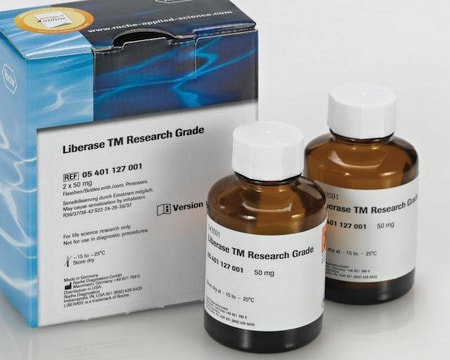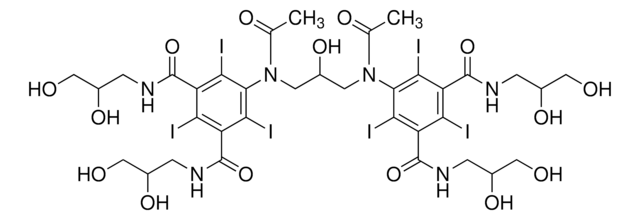G9779
Gey′s Balanced Salt Solution
liquid, sterile-filtered, suitable for cell culture
Synonyme(s) :
GBSS
Se connecterpour consulter vos tarifs contractuels et ceux de votre entreprise/organisme
About This Item
Code UNSPSC :
12352207
Nomenclature NACRES :
NA.75
Produits recommandés
Stérilité
sterile-filtered
Forme
liquid
Technique(s)
cell culture | mammalian: suitable
Impuretés
endotoxin, tested
Composants
glucose: 1.0 g/L
phenol red: no
NaHCO3: 2.27 g/L
Conditions d'expédition
ambient
Température de stockage
2-8°C
Description générale
Gey′s Balanced Salt Solution is a phosphate bicarbonate buffered cell suspension and washing solution. A complete balanced salt solution with a unique combination of ""salt forms"". Contains the same five basic ions as EBSS, HBSS and DPBS.
Application
Gey′s Balanced Salt Solution has been used in:
- organotypic mouse brain slice culture
- isolation of primary murine liver sinusoidal endothelial cells (LSECs)
- organotypic hippocampal slice cultures
Code de la classe de stockage
12 - Non Combustible Liquids
Classe de danger pour l'eau (WGK)
nwg
Point d'éclair (°F)
Not applicable
Point d'éclair (°C)
Not applicable
Certificats d'analyse (COA)
Recherchez un Certificats d'analyse (COA) en saisissant le numéro de lot du produit. Les numéros de lot figurent sur l'étiquette du produit après les mots "Lot" ou "Batch".
Déjà en possession de ce produit ?
Retrouvez la documentation relative aux produits que vous avez récemment achetés dans la Bibliothèque de documents.
Les clients ont également consulté
Victor Olsavszky et al.
Gene, 768, 145284-145284 (2020-11-02)
The Class H scavenger receptors Stabilin-1 (Stab1) and Stabilin-2 (Stab2) are two of the most highly expressed genes in liver sinusoidal endothelial cells (LSECs). While Stab1-deficient (Stab1KO) and Stab2-deficient (Stab2KO) mice are phenotypically unremarkable, Stab1/2-double-deficient (StabDKO) mice exhibit perisinusoidal liver
Tim C Chang et al.
Lab on a chip, 14(23), 4540-4551 (2014-10-03)
There is a critical unmet need to tailor chemotherapies to individual patients. Personalized approaches could lower treatment toxicity, improve the patient's quality of life, and ultimately reduce mortality. However, existing models of drug activity (based on tumor cells in culture
Pei-Hsuan Wu et al.
Nature genetics, 52(7), 728-739 (2020-07-01)
Pachytene PIWI-interacting RNAs (piRNAs), which comprise >80% of small RNAs in the adult mouse testis, have been proposed to bind and regulate target RNAs like microRNAs, cleave targets like short interfering RNAs or lack biological function altogether. Although piRNA pathway
Dan Xu et al.
The Journal of experimental medicine, 215(4), 1169-1186 (2018-03-01)
The pathophysiology of drug-resistant pediatric epilepsy is unknown. Flow cytometric analysis of inflammatory leukocytes in resected brain tissues from 29 pediatric patients with genetic (focal cortical dysplasia) or acquired (encephalomalacia) epilepsy demonstrated significant brain infiltration of blood-borne inflammatory myeloid cells
Soichiro Yamanaka et al.
Developmental cell, 51(1), 21-34 (2019-09-03)
Facultative heterochromatin forms and reorganizes in response to external stimuli. However, how the initial establishment of such a chromatin state is regulated in cell-cycle-arrested cells remains unexplored. Mouse gonocytes are arrested male germ cells, at which stage the genome-wide DNA
Notre équipe de scientifiques dispose d'une expérience dans tous les secteurs de la recherche, notamment en sciences de la vie, science des matériaux, synthèse chimique, chromatographie, analyse et dans de nombreux autres domaines..
Contacter notre Service technique













